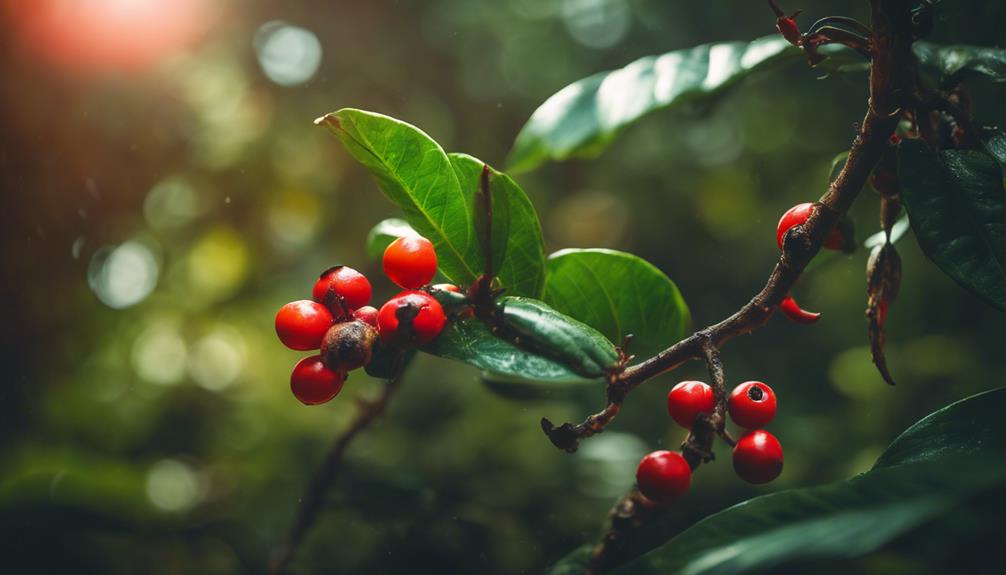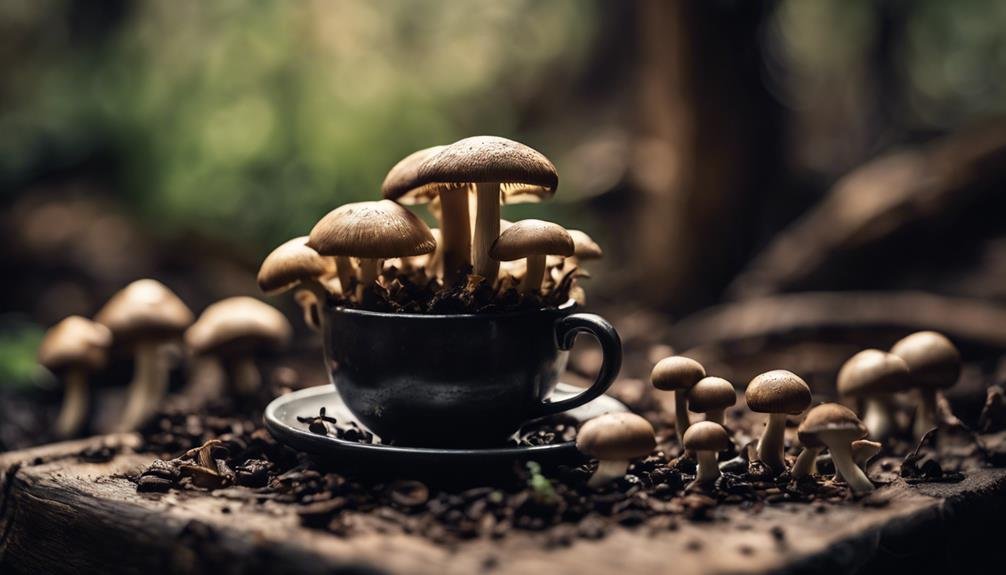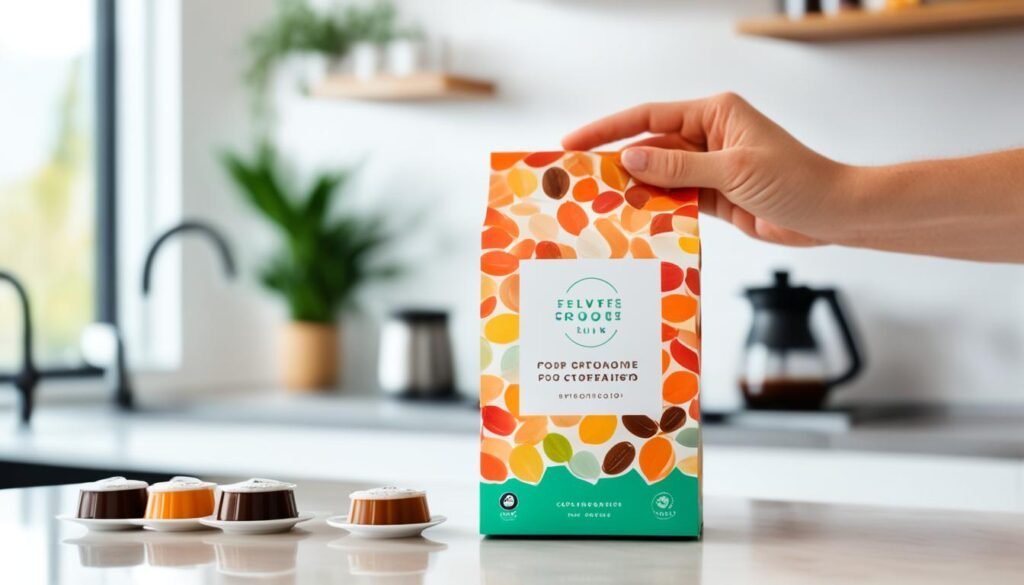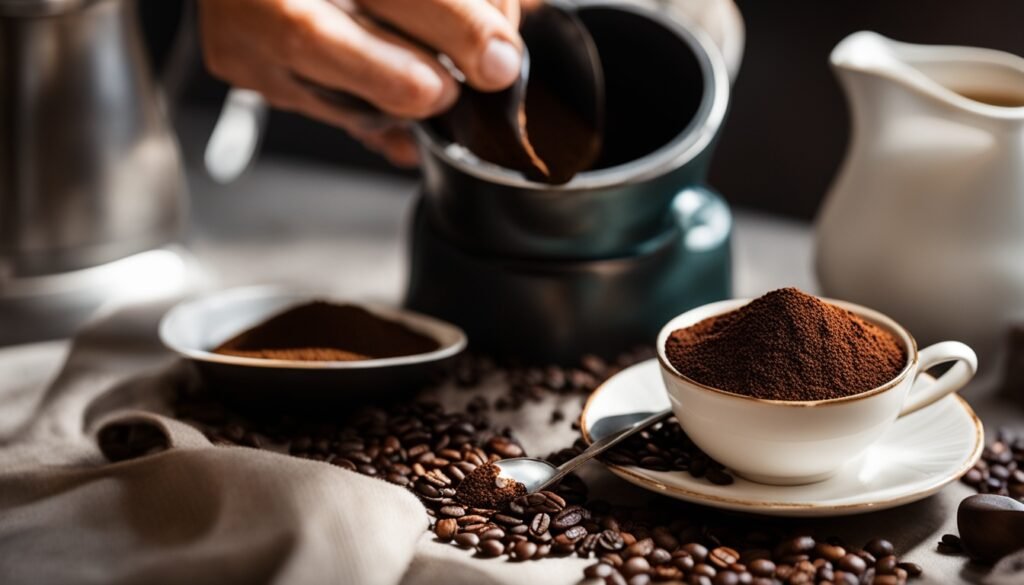Americans consume a staggering 400 million cups of coffee daily, showcasing our deep affection for this beverage. Ensuring its freshness, particularly when refrigerated, is paramount. I aim to enlighten you on coffee’s shelf life and storage strategies, keeping your coffee tasting great.
For a coffee aficionado, the impact of proper storage on taste and quality is profound. Whether you prefer cold brew or aim to preserve leftover coffee, understanding the fridge’s impact on coffee’s longevity is essential. Let’s delve into the realm of refrigerated coffee, uncovering methods to sustain its flavor and freshness.
Understanding Coffee Shelf Life
Coffee freshness is essential for a delightful cup of coffee. Several elements influence the quality of your coffee, including refrigeration’s impact on its shelf life. Let’s explore these factors and their effects.
Factors Affecting Coffee Freshness
The type of coffee, whether whole beans, ground, or brewed, significantly affects its longevity. Factors like air, moisture, and light can quickly diminish coffee’s flavor. Whole beans generally stay fresh longer because they have less surface area exposed to these elements.
The Impact of Refrigeration on Coffee
Refrigeration can both help and hinder coffee storage. It extends shelf life but might also alter taste. Cold temperatures can mute the rich flavors of dry coffee. However, refrigeration is beneficial for maintaining the quality of brewed coffee, especially for cold brew lovers.
| Coffee Type | Room Temperature | Refrigerated |
|---|---|---|
| Whole Beans | 1-2 weeks | 1-2 months |
| Ground Coffee | 1 week | 2-3 weeks |
| Brewed Coffee | 12-24 hours | 3-4 days |
Why Proper Storage Matters
Correct storage is vital for preserving coffee’s flavor and aroma. I’ve observed that proper storage extends the quality of my coffee. Using airtight containers and keeping coffee away from strong odors in the fridge enhances coffee freshness and taste.
Understanding these factors has improved my coffee’s quality, whether refrigerated or not. By focusing on storage methods, I consistently enjoy a flavorful cup, regardless of when I bought my beans.
How Long Is Coffee Good for in the Fridge?
I’ve often pondered the shelf life of my beloved brews in the fridge. Through diligent research and personal trials, I’ve uncovered that storing coffee in the fridge can extend its life. This is true for various coffee types.
Let’s delve into the coffee fridge life for different preparations:
| Coffee Type | Refrigerator Storage Duration | Quality Considerations |
|---|---|---|
| Black Coffee | Up to 4 days | Use a sealed container for best results |
| Cold Brew Concentrate | 7-10 days | Maintains flavor profile longer |
| Coffee with Milk/Creamer | 1-2 days | Check for signs of spoilage before consuming |
| Iced Coffee | About 4 days | Flavor may deteriorate over time |
These guidelines aim to enhance coffee fridge life, but it’s crucial to acknowledge that taste and quality will decline over time. Refrigeration is a delicate balance between freshness and flavor preservation.
To enjoy the best coffee experience, I suggest consuming refrigerated coffee within the recommended time frames. This approach ensures you savor your brew at its peak flavor while still benefiting from extended storage.
Storing Different Types of Coffee
Understanding the nuances of coffee storage can significantly enhance the taste and freshness of our beloved brews. Let’s delve into the optimal methods for storing various coffee types to maintain their peak quality.
Whole Coffee Beans
Whole beans are the epitome of freshness. I secure mine in an airtight container at room temperature, shielding them from sunlight. This approach ensures they remain flavorful for up to three weeks. For extended periods, I recommend a cool, dark pantry for storage.
Ground Coffee
Ground coffee requires more attention to detail. I employ an opaque, airtight container to shield it from light and moisture. Proper storage maintains its freshness for about two weeks. I grind only what I intend to use immediately to preserve the flavor.
Brewed Coffee
Storing brewed coffee poses a challenge. I prioritize drinking it fresh whenever feasible. If I must store it, I transfer it to an airtight container and refrigerate. It remains consumable for 3-4 days, though the taste may slightly alter. I eschew reheating it multiple times to prevent bitterness.
Cold Brew Coffee
Cold brew is my go-to for summer. I maintain it in a sealed glass jar within the fridge. It retains its freshness for up to 10 days. For optimal flavor, I dilute it with water or milk just before consumption.
| Coffee Type | Storage Method | Shelf Life |
|---|---|---|
| Whole Beans | Airtight container, room temp | 1-3 weeks |
| Ground Coffee | Opaque, airtight container | 1-2 weeks |
| Brewed Coffee | Sealed container, refrigerated | 3-4 days |
| Cold Brew | Glass jar, refrigerated | 7-10 days |
Best Practices for Refrigerating Coffee
Mastering the art of cold coffee storage is crucial for maintaining its flavor. I’ve discovered several strategies to ensure my coffee remains delicious, even when chilled. Let’s explore the optimal methods for refrigerating coffee and sustaining its exquisite taste.
Airtight Containers: A Must-Have
Airtight containers are indispensable for storing cold coffee. They effectively seal in the flavor and block out odors. I always move my coffee to a sealed container before refrigeration. This simple action significantly aids in preserving coffee flavor and maintaining its freshness.
Avoiding Moisture and Odors
Moisture poses a significant threat to coffee quality. I ensure to remove ice cubes from my iced coffee before refrigerating it. This step prevents dilution and preserves the flavor. Additionally, it’s vital to store coffee away from foods with strong odors. Coffee can easily absorb these smells, altering its taste.
Proper Labeling and Dating
Proper labeling is crucial for managing cold coffee storage. I always label my coffee containers with the date. This approach helps me monitor freshness and prioritize the oldest brews. For cold brew, I keep the concentrate separate from water or milk. This strategy prolongs its shelf life and ensures its distinctive flavor.
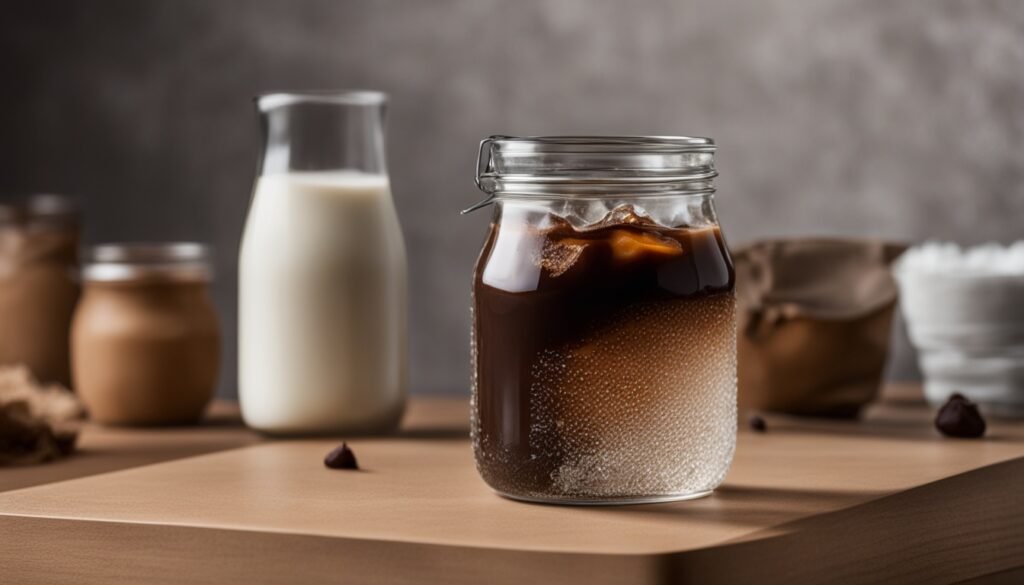
| Storage Method | Shelf Life | Best For |
|---|---|---|
| Airtight Container | 3-4 days | Brewed Coffee |
| Sealed Bottle | 7-10 days | Cold Brew Concentrate |
| Mason Jar | 2-3 days | Iced Coffee (no ice) |
Always inspect your refrigerated coffee for signs of spoilage before consumption. With these guidelines, you’ll excel in keeping coffee flavor intact.
The Dos and Don’ts of Coffee Storage
Over the years, I’ve delved deep into the world of coffee storage. I’m eager to pass on my insights to you. Mastering the art of coffee preservation is crucial for keeping your brews tasting their best.
| Do | Don’t |
|---|---|
| Store coffee in airtight containers | Leave brewed coffee at room temperature for over 4 hours |
| Keep coffee away from heat, light, and moisture | Store ground coffee or whole beans in the fridge (unless in a very humid environment) |
| Refrigerate cold brew concentrate for up to 10 days | Freeze coffee beans or grounds as a long-term storage solution |
| Consume coffee with milk within 2 hours if left at room temperature | Expose coffee to strong odors or flavors |
Adhering to these guidelines will help keep your coffee fresh and full of flavor. Remember, the right storage conditions are essential for preserving the quality of your coffee. I always store my coffee in a cool, dark spot and use it within a few weeks of opening for optimal taste.
Preserving Coffee Flavor in the Fridge
Storing coffee in the fridge isn’t just about keeping it cold. It’s about ensuring the coffee’s flavor remains intact and maintaining its quality after refrigeration. I’ve discovered several essential techniques to help you savor that ideal cup, even when it’s chilled.
Temperature Control
For coffee, the ideal fridge temperature is 40°F (4°C). This setting is crucial for preserving the coffee’s flavor. It prevents the coffee from freezing, which can harm its delicate oils.
Minimizing Exposure to Air
Air can ruin coffee. I use airtight containers or vacuum-sealed bags to keep freshness in. This approach is vital for maintaining coffee quality after refrigeration.
Separating Coffee from Strong-Smelling Foods
Coffee absorbs odors easily. I keep my coffee away from foods with strong smells. This strategy helps prevent flavor contamination, ensuring my coffee tastes just right.
| Storage Method | Flavor Preservation | Shelf Life |
|---|---|---|
| Airtight Container | Excellent | 1-2 weeks |
| Vacuum-Sealed Bag | Superior | 2-3 weeks |
| Original Packaging | Fair | 3-5 days |
By adopting these strategies, I’ve noticeably enhanced my coffee’s taste and shelf life. Remember, proper storage is crucial for enjoying that perfect cup, even after refrigeration.
Alternative Storage Methods
The fridge isn’t the only way to store coffee. I’ve looked into different methods to keep your coffee fresh and tasty. Let’s explore some alternatives that might surprise you.
Freezing Coffee: Pros and Cons
Freezing coffee is a topic of debate. It can help extend its shelf life but might alter the flavor. Freezing whole beans is generally better than freezing ground coffee. If you freeze, make sure to use airtight containers to avoid freezer burn.
Room Temperature Storage Options
For everyday use, storing coffee at room temperature is best. I keep my whole beans and ground coffee in airtight containers, away from light and heat. This method helps preserve the flavor and aroma for up to a month. Using proper storage techniques can extend the life of unopened coffee, keeping it fresh for up to a year.
Vacuum-Sealed Packaging
Vacuum-sealing is a breakthrough for long-term storage. It eliminates air, which is a major foe of coffee. I’ve successfully stored vacuum-sealed coffee for several months without a decline in quality.
| Storage Method | Shelf Life | Best For |
|---|---|---|
| Freezing | Up to 3 months | Whole beans |
| Room Temperature | 2-4 weeks | Daily use |
| Vacuum-Sealed | 6-12 months | Long-term storage |
The aim of any storage method is to keep your coffee fresh. Try out these techniques to see what suits your coffee routine best. And if you’re interested in fridge storage, check out this guide on how long coffee lasts in the fridge.
Conclusion
I’ve explored essential coffee storage practices to extend your coffee’s shelf life. Ensuring your coffee remains fresh is vital for that ideal brew. Note, refrigeration suits brewed coffee and cold brew well but not whole beans or grounds.
Using airtight containers is crucial to protect your coffee from moisture and odors. This simple action significantly enhances flavor preservation. It’s essential to consume your coffee within the suggested time frames for optimal taste.
Even though stored coffee might be safe, its quality and flavor will deteriorate over time. For the best coffee experience, aim to enjoy freshly brewed coffee whenever feasible. Adhering to these storage guidelines ensures you consistently enjoy delightful coffee.
FAQ
How long does coffee last in the fridge?
Coffee’s fridge shelf life varies by type. Black coffee can last up to 4 days. Cold brew concentrate remains fresh for 7-10 days. Coffee with milk or creamer should be consumed within 1-2 days. Iced coffee can last about 4 days but its flavor may degrade.
What factors affect coffee freshness?
Coffee’s shelf life is influenced by its form, storage conditions, and exposure to air, moisture, and light. Proper storage is key to maintaining coffee’s flavor and aroma.
How does refrigeration impact coffee quality?
Cold fridge temperatures can alter the taste of dry coffee but extend its shelf life. Refrigeration can preserve brewed coffee and cold brew for a few days. However, it’s not ideal for whole beans or ground coffee.
What are the best storage methods for different types of coffee?
Whole coffee beans can last 1-3 weeks at room temperature in an airtight container. Ground coffee remains fresh for 1-2 weeks in an opaque, airtight container. Brewed hot coffee is best consumed within 4 hours at room temperature or 3-4 days in the fridge. Cold brew concentrate lasts 7-10 days in the fridge.
How can I extend the shelf life of coffee in the fridge?
Use airtight containers to block moisture and odors. Remove ice cubes from iced coffee before refrigerating to avoid dilution. Label containers with the date of storage to track freshness. Store cold brew concentrate separately from water or milk.
What are the dos and don’ts of coffee storage?
Store coffee in airtight containers away from heat, light, and moisture. Avoid leaving brewed coffee at room temperature for more than 4 hours. Refrigerate cold brew concentrate for up to 10 days. Avoid storing ground coffee or whole beans in the fridge unless you live in a very humid environment.
How can I preserve coffee flavor in the fridge?
Keep a consistent temperature around 40°F (4°C). Use airtight containers or vacuum-sealed bags to minimize air exposure. Keep coffee away from strong-smelling foods to prevent flavor contamination. For cold brew, store the concentrate separately from any added water or milk.
Is freezing coffee a good option for long-term storage?
Freezing coffee is a debated topic; it can extend shelf life but may affect flavor. Room temperature storage in airtight containers is best for whole beans and ground coffee. Vacuum-sealed packaging can significantly extend coffee’s shelf life by eliminating air exposure.






